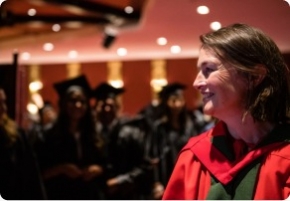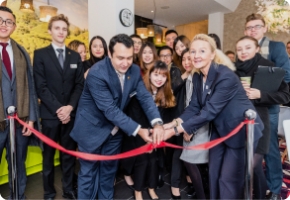- About
- Programs
- Campus Life
- Career Services
- Admissions
- News & Events
- Alumni
Taking a great idea and multiplying it
Taking a great idea and multiplying it
Franchising has proved to be a successful business model in the hospitality industry. Program leader and lecturer at HIM, Michael Heinrich, outlines how students who enroll in Hotel Institute Montreux’s franchise specialization course acquire a competitive edge for their future careers as hospitality leaders.
Understanding different business models and taking a closer look at winning strategies is central to what we teach our students at HIM. This is why we have included Franchise Business Management as one of our five undergraduate specializations, a popular choice for Bachelor of Business Administration in Hotel Management students seeking a greater understanding of how and why franchising works. As one student remarked, “Franchise specialization has inspired me to think in innovative ways about how to implement this business model across different industries.”
Beyond the theory: learning from others’ experience
The course is designed to cover a wide range of topics related to franchising, including the principles of franchising, franchise strategy, and franchise compliance issues, covering intellectual property rights and the legal framework of franchise agreements. It’s not enough to simply learn the theory, we ensure students are given practical insights to gain a true understanding of the subject.
Thanks to our key partnership with hotel chain Accor and guest lectures from Accor’s leadership team, students explore real-life case studies and are given a core understanding of the agreement templates used to define the franchising relationship. Accor is one of the world’s leading hotel operator brands with around half of its 5,300 properties in 110 countries managed by franchisees.
In his guest lecture, Yannick Wagner, Vice President Development Northern Europe with Accor, shed light on the key factors and conditions that have contributed to Accor’s growth and the success of its franchisees. He emphasized the privileged support Accor offers to its franchisees and the challenges of this business model, for example ensuring that franchisees respect all the carefully defined standards of service Accor properties need to deliver, regardless of the country they are located in or the cultural background. To give students a better understanding of Franchise Strategy, my colleague, Bruno Dard, invited Jacques Merlotti, a leading Swiss entrepreneur and founding director of Pizzico SA, to tell students more about his partnerships, including his relationship with Ladurée Paris. In this interesting discussion, Bruno outlined key factors for success for both franchisors and franchisees.
Understanding the importance of franchise compliance is a key element of the specialization course. Entering into a franchise agreement is a bit like a marriage. When you marry, you might not typically think about the consequences of a divorce, but this shouldn’t be overlooked. In my Franchise Compliance course, students examine the importance of defining termination, as well as the legal and financial implications of the breach a franchise agreement. The legal framework detailed in agreements protects both the franchisor and the franchisee in the event that the agreement is breached.
Entering into a franchise agreement is a bit like a marriage.
Students are also taught by other guest lecturers from HIM to give them specialist insights into various factors related to franchising. As part of the Franchise Compliance course, business law lecturer, Dr Roberto Medda, highlighted the key role intellectual property law plays in franchising. He stressed that in any franchise agreement, regardless of the industry, “intellectual property rights are central to the contractual relationship between franchisor and franchisee and are the most common reason for legal disputes”.
A business model primed for profit
Good business boils down to generating revenue. How you generate that revenue, however, depends on the strategy you decide to adopt to capture market share. Franchising is one of these strategies in which “the owner of a business system (the franchisor) grants to an individual or group of individuals (the franchisee) the right to run a business selling a product or providing a service using the franchisor's business system.” This system of distribution and business expansion is believed to have originated in the mid-19th century with Issac Singer who realized that selling the rights to sell his sewing machines and training those who bought one would lead to a much faster business expansion and higher profits than if he continued on his own.
The most well-known example of franchising in the world is that of the McDonald’s restaurant chain. From a small hamburger stand run by two brothers to serving over 69 million customers daily in 36,000 outlets worldwide, it all began with Ray Kroc’s ides to apply the Henry Ford assembly-line concept to the fast food industry and the belief that customers of McDonald’s should expect the same product wherever in the world they may be.
Putting learnings into practice
At the end of the course, students get to apply everything they have learned from their course work and the knowledge shared by industry leaders in their final group project. Students were required to select one of the Accor brands and prepare a report about the legal structuring, IP rights, financial obligations, liabilities, duties and governing law in the selected EU country. As part of their final presentation, students had to act as the franchisor, pitching to sell their idea to potential franchisees.
On completion of the specialization course, students can feel confident that they have a good understanding of franchising in the hospitality industry, and all that it entails, from legal issues through to success strategies. As one student commented, “From attending the franchise compliance issues course, I understand the importance of franchise agreements and the impact of various details leading to a successful business.”











